Sustainable Construction
and Development
GRI
102-9
102-13
302-5
UNGC
Principle 1
Principle 7
Principle 8
Principle 9
Disclosure
Taking responsibility for the environment, conserving resources and meeting the needs of society are the foundation for lasting success in the real estate industry. In addition to a growing awareness of sustainability among our customers and partners, we are seeing more and more ambitious targets being set at a government and regulatory level. In 2021, the German government set itself the objective of achieving climate neutrality by 2045. The European Union announced a net zero target as part of the European Green New Deal, which it intends to meet by 2050. The EU Taxonomy lays down criteria in a number of relevant areas, including energy efficiency of new buildings, climate change adaptation, the circular economy and the use of materials. On the other hand, demand for new homes remains high; the recently signed Coalition Agreement expects 400,000 new homes to be built each year.
- Primary energy demand of newly built apartments introduced as a key performance indicator in the SPI 2021 Sustainability Performance Index – this amounted to 38.6 kWh/m2 in 2021
- 2020 target almost achieved: 2,135 new apartments completed Group-wide (target: approx. 2,300)
- More than 90% of new buildings completed in Germany are in energy efficiency class A or A+
- Signing of the new “klimaaktiv Pakt2030” agreement and pursuit of the climate targets set therein until 2030
- Analysis of the climate footprint of a building throughout its entire life cycle and the use of sustainable construction methods (e.g., hybrid-timber structures and pre-fabricated parts)
As one of the largest residential real estate companies in Europe, we can make a decisive contribution to meeting these objectives by finding approaches to building and development that are both sustainable and economically viable. This is particularly important given the fact that residential real estate is frequently used for far more than 50 years. Because of this, all of our new construction and refurbishment efforts have to be fit for the future so that we can meet the challenges that lie ahead. Increases in the price of materials and supply chain disruption have the potential to pose a risk to the economic viability of construction and development projects. By researching and using innovative construction materials and processes, we can meet our obligations to society and under the law, while also achieving our own sustainability and climate change mitigation objectives and remaining economically viable and competitive.
Our holistic approach to construction and refurbishment extends to how we procure and use sustainable materials and products, in addition to ensuring that statutory requirements are met in our supply chains. We are committed to implementing the requirements of the Duty of Care in Supply Chains Act (LkSG) in order to identify and minimize risks in the supply chain. An additional benchmark here will be the applicability of the minimum safeguards criteria of the EU Taxonomy. These criteria help to make our supply chains more resilient and less susceptible to disruption. Failing to meet these requirements would damage the reputation of Vonovia and could result in legal fees.
We have identified Sustainable Construction and Refurbishment as a material topic due to its importance in the context of our business model. Other important topics are Sustainable Materials and Products and Social and Environmental Standards in the Supply Chain.


